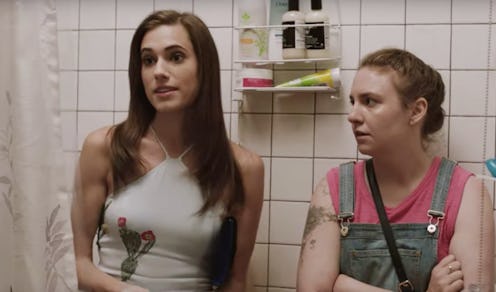Entertainment
Lena Dunham Shares Her Original Pitch For 'Girls'

The argument against Girls goes a little like this: it's too fluffy, too privileged, too out of touch. It's that scene where Shoshanna is unemployed, but still eating expensive sushi. It's that scene where Hannah expects her parents to keep subsidizing her life so she can intern unpaid. So I was delighted to read Lena Dunham's original pitch for Girls, which confirmed that actually, it's far more political than the haters would have you think.
In an oral history of the show recorded for The Hollywood Reporter, Dunham suggests that no pitch for a female-dominated show can exist without namechecking its auspicious predecessors, Sex and the City and Gossip Girl :
Sex and the City depicted women who had mastered their careers and were now being driven crazy by the tick of their biological clocks. Gossip Girl is about losing your virginity and gaining popularity, in a world where no one is old enough to vote or has to worry about making a living. But between adolescence and adulthood is an uncomfortable middle-ground, when women are ejected from college and into a world with neither glamour nor structure. The resulting period of flux is heartbreaking and hilarious and way too much. It’s humbling and it’s sexy and it’s ripe for laughs.
Well, I'm not sure Girls ever reached a point where anything was sexy, especially not the sex scenes, but sure. Dunham continues:
Products of the recession, these girls are overeducated and underemployed, sure that they’re too smart for their positions as assistants, nannies, and waitresses but not necessarily motivated enough to prove it (or even do their jobs well enough to advance). They have that mix of know-it-all entitlement and scathing self-deprecation that is the mark of all great Jewish comedians and many 24-year-old women with liberal arts degrees.
This is fascinating. While I'm still not the sure that the show's financial situation totally makes sense (how did Hannah make enough from her coffee shop job to rent a room in New York?), its focus on a generation of workers who were highly educated but, thanks to the recession, couldn't score a meaningful job felt unique for its time and authentic in its portrayal of a sort of emerging class: the precariat. But what are the precariat?
The Guardian defines the term in the following:
It consists not just of everybody in insecure jobs – though many are temps, part-timers, in call centers or in outsourced arrangements. The precariat consists of those who feel their lives and identities are made up of disjointed bits, in which they cannot construct a desirable narrative or build a career.
While it may not feel like Girls was overly political, the fact that the show focused as much on what the characters were doing with their careers (and their money struggles) as their love lives meant the issue of work was always at the forefront of the show. Heck, the show even opens on this issue, showing the 20something Hannah being taken out to dinner by her parents as they attempt to cut her off financially, gently telling her that they can no longer afford to support her while she carries out her unpaid internship in publishing. In what other generation would unpaid internships have been an expected first step into a job in the first place?
Via Hannah (writer), Marnie (singer-songwriter), and Adam (actor), the show made its politics clear by focusing on the most competitive field: the creative industries. Like so many of the precariat generation, the three inched closer to their targets via making compromises, juggling their chosen careers with (slightly better) paid work. Hannah tried writing advertorials and writing fiction in the evening before moving to Utah to create space and time for writing; Marnie had to pay the bills with a humiliating job as a a hostess at a night club, wearing a skimpy drum majorette-esque costume; and Adam works as a part-time carpenter before he gets his big break. While we have yet to see if their bets have paid off, Adam and Marnie's hard work brings Adam into the spotlight and brings Marnie into the discussion stage of scoring a recording contract. The real question in Season 6 will be whether all of Hannah's hard work will finally pay off.
If the show remains true to its first pitch, perhaps not. Hannah was always the one character pursuing an artistic calling who maybe wasn't quite motivated enough to put in the hard work. And in an era of precariat workers and dwindling returns in both journalism and publishing, maybe just having talent isn't quite enough anymore.